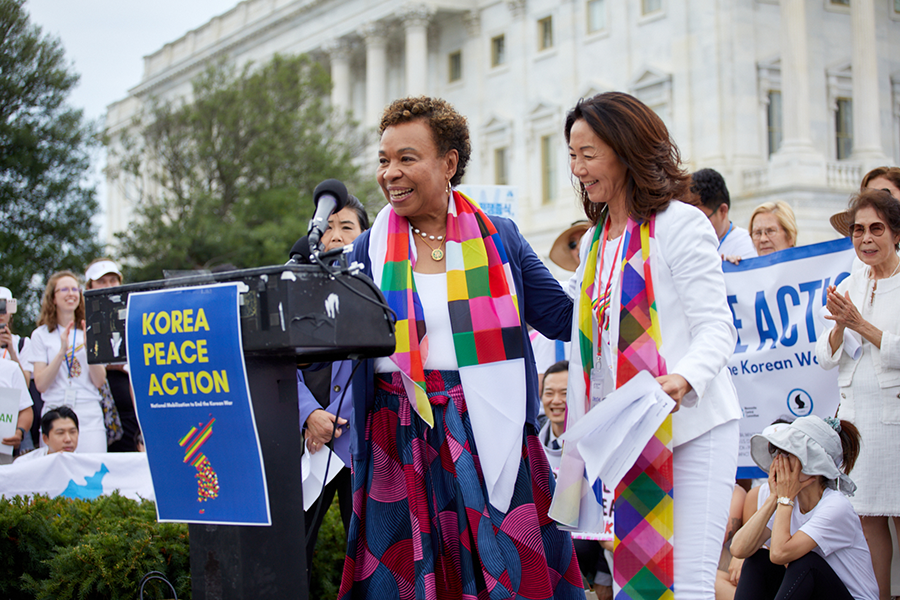"The Arms Control Association’s work is an important resource to legislators and policymakers when contemplating a new policy direction or decision."
On Korean War Anniversary, Activists Seek Formal Peace
September 2023
By Jupiter Huang
Activists are using this year’s 70th anniversary of the Korean War armistice to revive the push for a peace treaty formally ending the 1950-1953 conflict, which continues to fuel tensions among North Korea, South Korea, and the United States.
 Drawing combat veterans, generations of Korean Americans, aid workers, and other activists, the National Mobilization to End the Korean War convened in Washington on July 27-28 to call for sustained diplomatic engagement toward a binding peace agreement on the Korean peninsula and a review of the U.S. travel ban on North Korea. These goals are embodied in H.R. 1369, titled the Peace on the Korean Peninsula Act.
Drawing combat veterans, generations of Korean Americans, aid workers, and other activists, the National Mobilization to End the Korean War convened in Washington on July 27-28 to call for sustained diplomatic engagement toward a binding peace agreement on the Korean peninsula and a review of the U.S. travel ban on North Korea. These goals are embodied in H.R. 1369, titled the Peace on the Korean Peninsula Act.
“Our progress is the result of a grassroots, people-powered movement,” said Christine Ahn, founder and executive director of Women Cross DMZ, which led a group of 30 international peacemakers in 2015 across the Demilitarized Zone between the two Koreas. “We are here to say, after decades of failed U.S. policy, the only pathway to resolve the impasse is for the U.S. to sign a peace agreement with North Korea.”
Although the fighting stopped in 1953 when North Korea, China, and the United States reached an armistice, South Korea did not sign it, and no formal peace treaty was concluded.
The effort to revive peace treaty discussions comes amid rising regional tensions. North Korea is advancing its nuclear weapons program and expanding its missile arsenal. It has been testing missiles in record numbers, including the new Hwasong-18 intercontinental ballistic missile. In response to a port call by the USS Kentucky at Busan on July 18, the first by a U.S. nuclear-capable ballistic missile submarine in South Korea since 1981, North Korea launched two short-range ballistic missiles.
Meanwhile, the United States and South Korea signed the Washington Declaration on April 26, reaffirming their mutual defense commitments and expanding nuclear consultations. On May 25, they held their largest joint live-fire exercises in five years.
“Conflicts don’t always start in a rational environment, and misunderstandings, misperceptions, [and] misassessments can lead to what would later be deemed ‘irrational behavior,’” retired Lt. Gen. Dan Leaf, former acting head of the U.S. Indo-Pacific Command, said in a July 31 interview with Arms Control Today. “We are one bad decision away from a nuclear exchange. But any legitimate pursuit of peace, [which] can be done in concert with maintaining a deterrent posture…could be a game changer.”
The Korean War is technically the longest U.S. overseas conflict. The armistice called for belligerents to reach a formal peace settlement within three months. An estimated 3-4 million people died, most of them civilians. U.S. aerial bombing campaigns leveled most North Korean cities, and more than 36,000 U.S. service members also lost their lives in the fighting.
“That was 1953. This is 2023…. America’s failure to end the war has facilitated relentless military buildup and instability on the peninsula, all bankrolled by U.S. taxpayers,” Rep. Barbara Lee (D-Calif.) told a press conference on July 27. “The continued unresolved war might seem like a technicality, but it is not. The human impact is massive, and the risk of a new conflict breaking out remains high.”
Joy Gebhard, who was born near Pyongyang, was separated from her family during the Korean War and moved to the United States in 1956. At the press conference, she noted the difficulty posed by the 2017 travel ban on U.S. citizens.
“I have given my best to serve my adopted country as a teacher, nurse, business owner, humanitarian, and taxpayer, but have given so little to my own family. I cannot visit my own flesh and blood. I cannot visit the graves of my parents one last time. I cannot even send a letter to say hello,” she said. “I believe that we must end the Korean War so that families can be reunited and we can heal from the wounds of war.”
